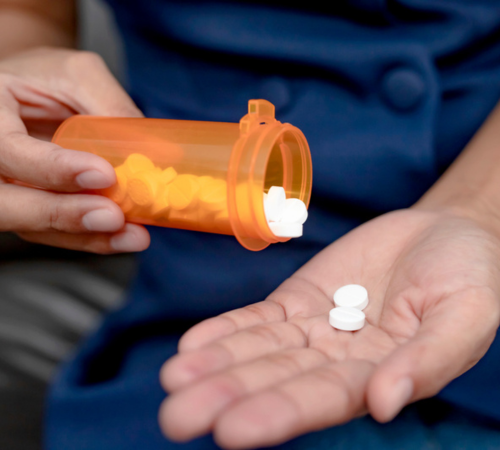
Written by:

Medically Reviewed by:
Last Updated:
January 6th, 2025
Nitrazepam Addiction | Signs, Symptoms & Effects
Nitrazepam offers hope to those struggling with sleepless nights and anxiety-filled days, but this hope can quickly take a sinister turn. Like many benzodiazepines, Nitrazepam has an enormous risk of abuse and addiction with life-ruining consequences. It is important that anybody who is taking Nitrazepam, whether by prescription or otherwise, is aware of the risks because they can be wide-reaching and harm both users and their families.

What is Nitrazepam?
Nitrazepam, also known by brand names like Mogadon, was first introduced in the 1960s as part of the benzodiazepine family. These drugs were originally developed as safer alternatives to barbiturates, which had a higher risk of overdose and addiction.
Like all benzos, Nitrazepam is a GABA enhancer. This means it boosts the effects of GABA, a neurotransmitter that helps slow down brain activity, reduces anxiety and brings on sleep.
Nitrazepam is mostly prescribed for the short-term treatment of severe insomnia, but it can also be used to manage anxiety disorders and sometimes to control seizures in people with epilepsy.
While these medical uses can help many people, Nitrazepam’s side effects can be significant.
Common Nitrazepam side effects include:
- Drowsiness
- Dizziness
- Fatigue
- Muscle weakness
More severe side effects can include:
- Confusion
- Memory problems
- Coordination issues
- Respiratory depression
- Nitrazepam addiction
How does Nitrazepam addiction develop?
There are three main ways that people develop a Nitrazepam addiction: prescription use, self-medication and recreational abuse. Here are some common scenarios:
1. Prescription Nitrazepam use
Sarah is a 45-year-old teacher struggling with severe insomnia. Her doctor prescribed Nitrazepam to help her get the rest she desperately needed. Initially, the medication worked wonders, allowing her to sleep through the night for the first time in years. However, after a few months, she found herself needing higher doses of Nitrazepam to sleep.
Despite her doctor’s warnings, Sarah began taking more than the prescribed amount and eventually, couldn’t sleep without Nitrazepam at all. As Sarah became more and more dependent on Nitrazepam, she started experiencing withdrawal symptoms like anxiety and tremors if she missed a dose and began to take it to deal with the stress of teaching.
2. Self-medication
John, a 30-year-old software engineer, has been battling anxiety and panic attacks for years. He decided to self-medicate with Nitrazepam after reading about its calming effects online and managed to buy the drug from an overseas pharmacy.
At first, Nitrazepam seemed like a miracle cure, helping John stay calm during stressful situations. But soon, his previous dose no longer worked so he started taking more when he felt an attack of anxiety or panic coming on. John began to recognise his growing dependence, but his anxiety worsened whenever he tried to stop, trapping him in a cycle of Nitrazepam use.
3. Recreational Nitrazepam abuse
Emma, a 22-year-old university student, was introduced to Nitrazepam at a party. She enjoyed the relaxed, euphoric feeling it gave her and started using it recreationally on weekends.
Over time, Emma’s occasional use turned into a regular habit. She began taking Nitrazepam to cope with exam stress and social anxiety, finding that her doses were increasing all the time. Eventually, Emma started to experience severe cravings and withdrawal symptoms when she didn’t take Nitrazepam, and she began to take it to feel like herself.
In all these cases, Nitrazepam addiction began with initial use, escalation due to tolerance and eventual dependency and addiction. This is typical of benzodiazepine addiction and is why Nitrazepam use requires strict medical supervision and prescription guidelines. In the UK, for example, Nitrazepam is classified as a Class C drug under the Misuse of Drugs Act 1971, making it illegal to possess or supply without a prescription.
Nitrazepam addiction symptoms to look out for
The narratives above demonstrate some of the most common Nitrazepam addiction symptoms such as increasing tolerance, withdrawal symptoms, cravings and escalating use.
If you recognise these in yourself, here are some questions to ask yourself which could confirm you have become addicted to Nitrazepam:
- Are you skipping work or school or not doing your usual chores because you are too focused on using Nitrazepam?
- Do you find yourself being secretive about how much Nitrazepam you are taking or hiding it from friends and family?
- Is buying Nitrazepam draining your bank account and making you spend money you don’t have?
- Are your relationships suffering because you’re using Nitrazepam, causing fights or making you pull away from loved ones?
- Are you feeling more anxious, depressed, or moody and finding it’s getting harder to manage your emotions without Nitrazepam?
- Are you visiting multiple doctors to get more prescriptions for Nitrazepam because one doctor won’t give you enough?
What makes Nitrazepam addictive?
The way Nitrazepam affects GABA means that it has the potential to cause addiction in anyone who takes it. However, there are lots of people who can take Nitrazepam safely, never increasing their dosage and never developing an addiction.
That is because Nitrazepam addiction risks increase with certain factors that some people have and others don’t. These include:
Mental health struggles
If you already have anxiety, depression or other mental health issues, you might be more likely to misuse Nitrazepam to feel better, which can lead to Nitrazepam addiction quickly.
Past substance abuse
If you have had problems with drugs or alcohol before, you might be more at risk of becoming addicted to Nitrazepam.
High stress levels
If you are going through a very stressful time or have experienced trauma that you have not resolved, you might come to rely on Nitrazepam to cope.
Genetics
Some people have a higher chance of becoming addicted because of their genetic makeup. This means that if addiction runs in your family, you might be more at risk.
Environment and friends
If you live in a place where drug use is common or accepted, you might be more likely to misuse Nitrazepam and become addicted.
The dangers of Nitrazepam addiction and abuse
Nitrazepam addiction and abuse really can affect your health, relationships and all other parts of your life. Here is what you know about the potential health dangers:
Risk of Nitrazepam overdose
Taking too much Nitrazepam can result in an overdose. This can be fatal, especially if you mix Nitrazepam with other drugs or alcohol.
Physical health issues
Misusing Nitrazepam can cause serious health problems like liver damage, stomach issues and a weak immune system, making it easier for you to get sick.
Mental problems
Using Nitrazepam for a long time can make mental health problems worse and create new mental issues. It can also make it hard for you to concentrate, remember things and think clearly.
Mood swings
Long-term use of Nitrazepam can make your emotions unstable, and you may feel anxious, depressed or moody for no reason.
Sleep problems
Even though Nitrazepam is supposed to help you sleep, using it for too long can actually mess up your natural sleep patterns, making it hard to get good-quality sleep.
Treatment for Nitrazepam addiction
Nitrazepam addiction treatment involves a few key steps to be effective. First is detox, where doctors help you safely stop using Nitrazepam by supervising you through withdrawal. Next comes benzodiazepine rehab, which includes therapy and counselling to understand why you became addicted to Nitrazepam and how you can live life without it. Finally, aftercare provides ongoing support to help you stay on track.
Get help for Nitrazepam addiction today
If you or someone you care about is having a hard time with Nitrazepam addiction, it’s really important to get help. Reach out to Linwood House today and we can help you plan your recovery path. Remember, asking for help is a brave step and can make a huge difference in getting your life back on track.
Frequently asked questions
(Click here to see works cited)
- BNF. “Nitrazepam | Drugs | BNF | NICE.” BNF, https://bnf.nice.org.uk/drugs/nitrazepam/. Accessed 27 March 2024.
UK-Rehab. “Nitrazepam Addiction | UK Rehab.” UK-Rehab, https://www.uk-rehab.com/benzodiazepine-addiction/nitrazepam/. Accessed 27 March 2024. - Kitabayashi, Yurinosuke et al. “Chronic high-dose nitrazepam dependence 123I-IMP SPECT and EEG studies.” Addiction biology vol. 6,3 (2001): 257-261. doi:10.1080/13556210120056507
Mind. “Comparing benzodiazepines.” Mind, https://www.mind.org.uk/information-support/drugs-and-treatments/sleeping-pills-and-minor-tranquillisers/comparing-benzodiazepines/. Accessed 27 March 2024.



